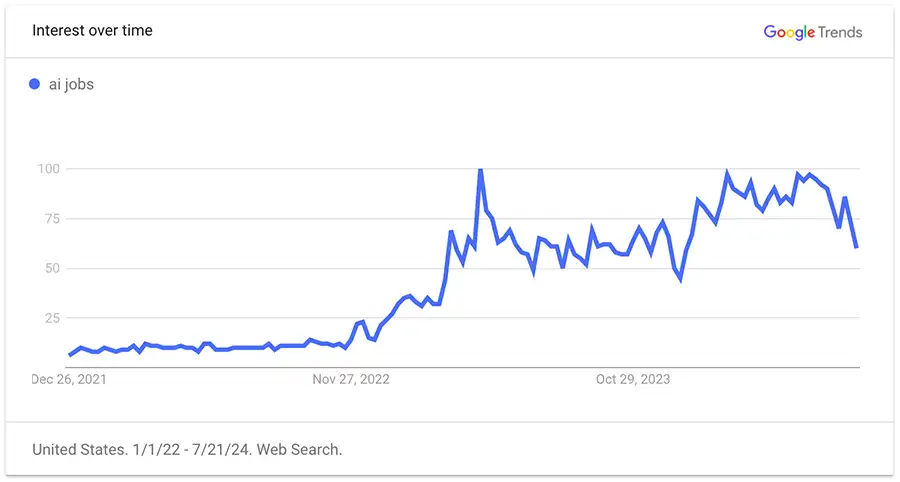
Are you interested in working from home and diving into the exciting world of artificial intelligence?
AI remote jobs offer a unique opportunity to make a significant impact in various industries while enjoying the flexibility of working from anywhere.
In 2024, The demand for skilled professionals in AI is growing rapidly.

Companies frequently look for skills in machine learning, data science, and relevant programming languages.
Exploring AI Remote Jobs
In recent years, AI has revolutionized many industries, with increasing demand for professionals skilled in data science, machine learning, and neural networks. Companies are looking for talent to develop smart systems, automate tasks, and analyze large datasets.
As AI continues to evolve, roles such as AI Research Scientist, Machine Learning Engineer, and Data Analyst have seen significant growth.
Remote work has expanded the talent pool, allowing specialists from different regions to collaborate on innovative projects seamlessly.
Finding AI Job Opportunities
You can find AI remote jobs on several dedicated platforms. Websites like NoDesk, and FlexJobs list opportunities.
Some roles include high-paying positions like AI Math Evaluator or Technical Lead, with salaries ranging from $40 to $80 per hour.
| Job Title | Average Salary |
|---|---|
| AI Research Scientist | $120,000 – $150,000 |
| Machine Learning Engineer | $110,000 – $140,000 |
| Data Scientist | $100,000 – $130,000 |
| AI Developer | $95,000 – $125,000 |
| Data Analyst | $70,000 – $90,000 |
| AI Math Evaluator | $50/hour |
| Technical Lead | $65,000 – $80,000 |
| AI Trainer | $60,000 – $80,000 |
| Natural Language Processing | $100,000 – $130,000 |
| AI Product Manager | $110,000 – $140,000 |
Remote Work Culture in AI
Remote work in AI fosters a collaborative environment where professionals from around the world can contribute to projects. This diversity brings a range of perspectives and ideas, accelerating innovation. Networking with peers and continuous learning are also integral, as AI evolves rapidly and requires ongoing skill development.
Required Skills and Qualifications
To excel in remote AI jobs, you should have a blend of core AI skills, additional technical proficiencies, and important soft skills.
Mastering these aspects will make you stand out to employers and contribute successfully to any project.
Core AI Skills and Machine Learning
You need a strong foundation in AI concepts and machine learning. This includes understanding algorithms, neural networks, and natural language processing (NLP). Proficiency in programming languages like Python, R, and Java is also useful.
Key Skills:
- Algorithms: Ability to design and implement efficient algorithms.
- Neural Networks: Understanding of different types, including convolutional and recurrent networks.
- NLP: Skills in text processing and sentiment analysis using AI tools.
- Hands-on experience with AI frameworks such as TensorFlow and Keras
Technical Proficiencies:
- Cloud Platforms: Skills in deploying and managing AI models on AWS, Azure, or Google Cloud.
- Data Handling: Ability to use Hadoop, Spark, and SQL for managing big data.
- Version Control: Experience with Git for code management and collaboration.
- Understanding APIs and integrating AI solutions into different applications
Important Soft Skills:
- Communication: Clear and concise interaction with team members.
- Problem-Solving: Ability to think critically and develop solutions quickly.
- Time Management: Effective prioritization and management of tasks.
When it comes to project management, being familiar with Agile methodology allows you to work in fast-paced environments and adapt to changing requirements seamlessly. Understanding Scrum practices and participating in sprint planning can also be beneficial to team productivity and project outcomes.
By focusing on these skills, you can enhance your qualifications and be well-prepared for a successful career in remote AI positions.
Building Your Professional AI Profile
Your resume should highlight your skills in AI, especially in areas like machine learning and data science. List your qualifications clearly, focusing on any certifications and degrees relevant to AI.
Include specific achievements such as successful projects or notable contributions.
Use bullet points to make it easy to read.
For example:
- Developed a generative AI model that improved text generation accuracy by 20%.
- Collaborated with a team of data scientists on a predictive analytics project.
Keep your resume concise, ideally one page. Tailor it to the job you’re applying for, emphasizing the skills and experiences that match the role.
Utilizing Online Platforms Effectively
Use online platforms to showcase your work and stand out from the competition:
Networking and Personal Branding
Connect with other AI professionals and industry leaders on platforms like LinkedIn.
Create a detailed LinkedIn profile highlighting your skills, projects, and contributions. Regularly share valuable content, including articles or insights into AI trends to position you as a thought leader.
Engage with others by commenting on posts and joining groups. Networking not only opens up job opportunities but also helps you stay updated with industry developments.
Frequently Asked Questions

James Waite
Founder of Remoteopia, James has worked in remote roles for 6 years. After a stint in recruitment, he now works as a director of website strategy in tech.




